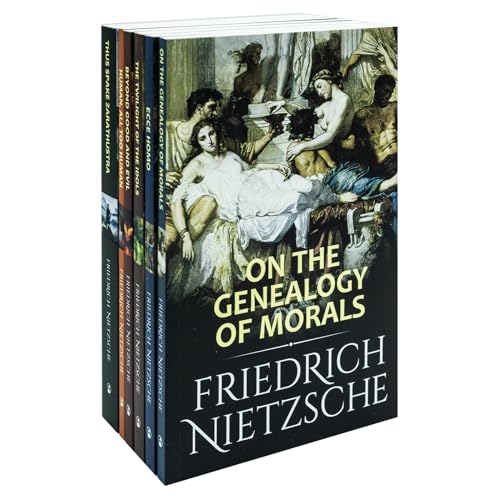Price
Shop / friedrich nietzsche books
Ecce Homo: How One Becomes What One Is--Revised Edition (Penguin Classics)
In late 1888, only weeks before his final collapse into madness, the renowned German philosopher Friedrich Nietzsche (1844-1900) set out to compose his autobiography, a work that would become one of the most intriguing yet bizarre examples of the genre ever written – Ecce Homo.
In this extraordinary work, Nietzsche traces his life, work, and development as a philosopher. He examines the influential figures he has identified with, struggled against, and then overcome, including the likes of Schopenhauer, Wagner, Socrates, and Christ. Nietzsche also predicts the cataclysmic impact of his 'forthcoming revelation of all values', a testament to his unwavering self-belief and the revolutionary nature of his philosophical ideas.
Both self-celebrating and self-mocking, penetrating and strange, Ecce Homo gives the final, definitive expression to Nietzsche's main beliefs and is, in every way, his last testament. The work offers a unique and captivating insight into the mind of one of the most influential and controversial thinkers of the 19th century.
Nietzsche's writing in Ecce Homo is characterized by a raw, unflinching honesty and a daring, unconventional style that challenges the reader's preconceptions and expectations. The philosopher delves deep into his own psyche, exploring his triumphs and struggles, his inspirations and demons, with a level of self-awareness and self-criticism that is both unsettling and compelling.
Throughout the work, Nietzsche grapples with the fundamental questions of human existence, examining the nature of morality, the role of the individual in society, and the search for meaning and purpose in a world that he saw as increasingly nihilistic and devoid of traditional values. His insights are both profound and provocative, often upending long-held beliefs and forcing the reader to confront their own assumptions and biases.
One of the most striking aspects of Ecce Homo is Nietzsche's relentless self-examination and his willingness to confront his own failings and shortcomings. He is unflinching in his critiques of himself, his work, and the impact he has had on the world around him. This level of self-reflection and introspection is rare in the genre of autobiography, and it serves to make Nietzsche's voice all the more compelling and authentic.
Despite the sometimes challenging and unconventional nature of Nietzsche's writing, Ecce Homo remains a captivating and thought-provoking work that continues to resonate with readers and scholars alike. Its enduring influence and impact on the fields of philosophy, psychology, and literary criticism is a testament to the power and complexity of Nietzsche's mind and the lasting legacy of his work.
product information:
| Attribute | Value | ||||
|---|---|---|---|---|---|
| publisher | Penguin Classics; Reprint edition (December 1, 1992) | ||||
| language | English | ||||
| paperback | 144 pages | ||||
| isbn_10 | 9780140445152 | ||||
| isbn_13 | 978-0140445152 | ||||
| reading_age | 18 years and up | ||||
| grade_level | 12 and up | ||||
| item_weight | 2.31 pounds | ||||
| dimensions | 7.76 x 5.2 x 0.37 inches | ||||
| best_sellers_rank | #260,745 in Books (See Top 100 in Books) #97 in Existentialist Philosophy #130 in Philosopher Biographies #367 in Modern Western Philosophy | ||||
| customer_reviews |
|













